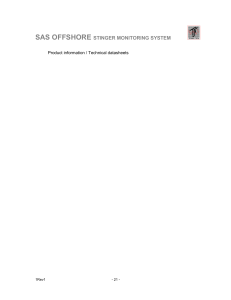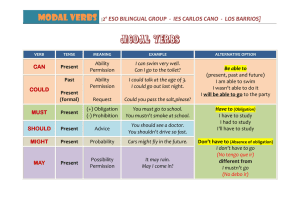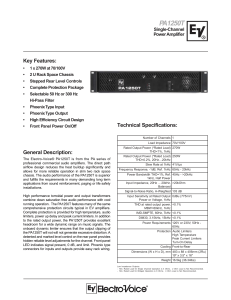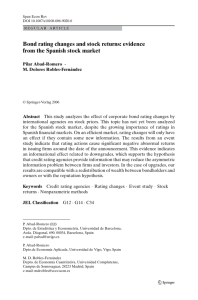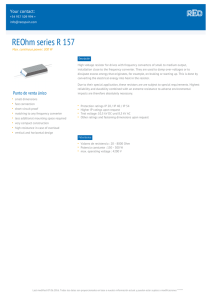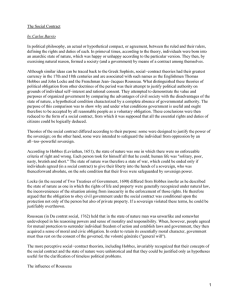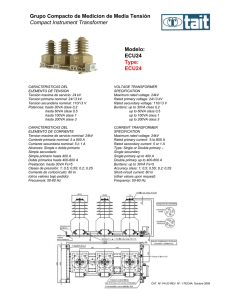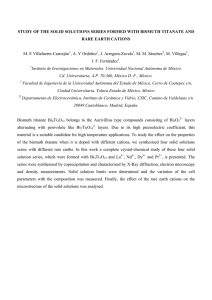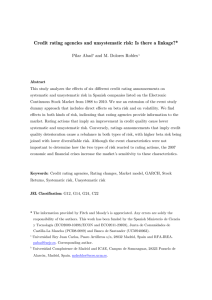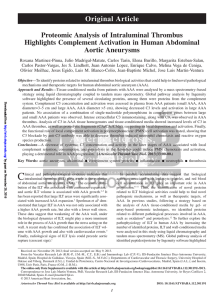Alerta HARBOR: A Pesar de Reducción Crediticia por Fitch Ratings
Anuncio
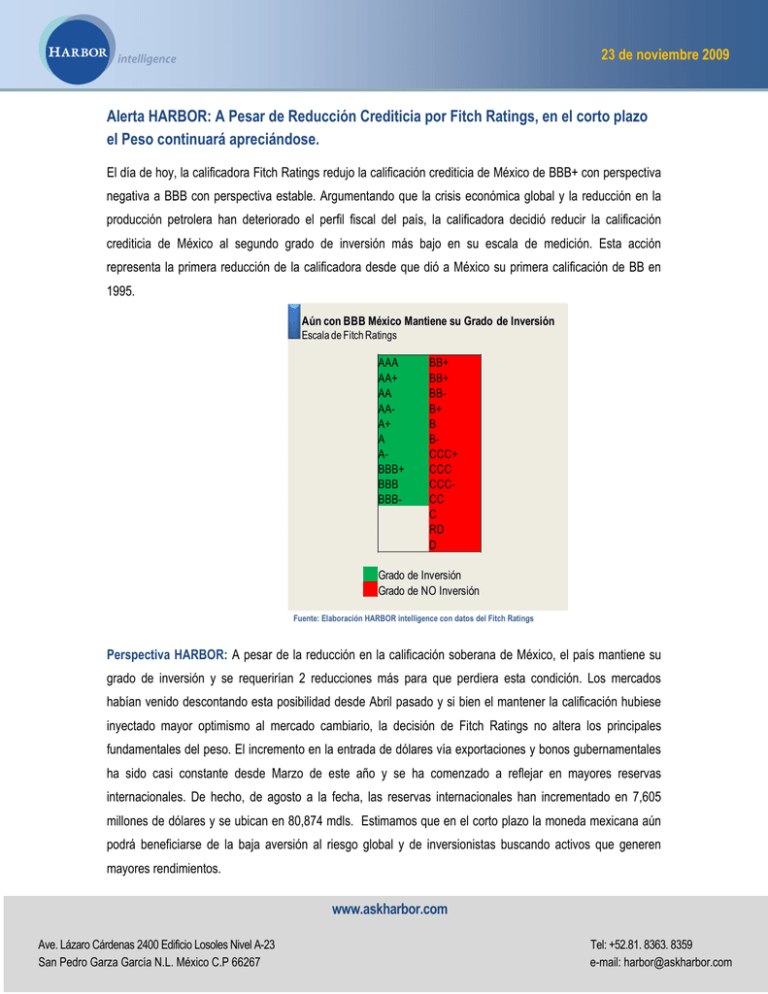
23 de noviembre 2009 Alerta HARBOR: A Pesar de Reducción Crediticia por Fitch Ratings, en el corto plazo el Peso continuará apreciándose. El día de hoy, la calificadora Fitch Ratings redujo la calificación crediticia de México de BBB+ con perspectiva negativa a BBB con perspectiva estable. Argumentando que la crisis económica global y la reducción en la producción petrolera han deteriorado el perfil fiscal del país, la calificadora decidió reducir la calificación crediticia de México al segundo grado de inversión más bajo en su escala de medición. Esta acción representa la primera reducción de la calificadora desde que dió a México su primera calificación de BB en 1995. Aún con BBB México Mantiene su Grado de Inversión Escala de Fitch Ratings AAA AA+ AA AAA+ A ABBB+ BBB BBB- BB+ BB+ BBB+ B BCCC+ CCC CCCCC C RD D Grado de Inversión Grado de NO Inversión Fuente: Elaboración HARBOR intelligence con datos del Fitch Ratings Perspectiva HARBOR: A pesar de la reducción en la calificación soberana de México, el país mantiene su grado de inversión y se requerirían 2 reducciones más para que perdiera esta condición. Los mercados habían venido descontando esta posibilidad desde Abril pasado y si bien el mantener la calificación hubiese inyectado mayor optimismo al mercado cambiario, la decisión de Fitch Ratings no altera los principales fundamentales del peso. El incremento en la entrada de dólares vía exportaciones y bonos gubernamentales ha sido casi constante desde Marzo de este año y se ha comenzado a reflejar en mayores reservas internacionales. De hecho, de agosto a la fecha, las reservas internacionales han incrementado en 7,605 millones de dólares y se ubican en 80,874 mdls. Estimamos que en el corto plazo la moneda mexicana aún podrá beneficiarse de la baja aversión al riesgo global y de inversionistas buscando activos que generen mayores rendimientos. www.askharbor.com Ave. Lázaro Cárdenas 2400 Edificio Losoles Nivel A-23 San Pedro Garza García N.L. México C.P 66267 Tel: +52.81. 8363. 8359 e-mail: [email protected] Foreign Currency Long Term Sovereign Credit Ratings INVESTMENT GRADE Moody`s RATING Aaa AMERICAS Canada United States EUROPE Standard & Poor´s ASIA & OCEANIA MIDDLE EAST & AFRICA Austria Denmnark Finland France Germany Luxembourg Australia New Netherlands Zeland Singapore Norway Spain Sweden Switzerland United Kingdom AAA Belgium Ireland(-) Aa1 RATING EUROPE Czech Republic Greece (rwn) Malta Slovakia China Israel Saudi Arabia(+) A+ Chile Poland South Korea Bahrain(-) Oman A Trinidad and Tobago Malasya South Africa A- Aruba Bahamas(-) BBB+ México(-) Greece Poland BBB Barbados Croatia(-) Russia(-) BBB- Brazil Peru Hungary Iceland(-) Baa3 Barbados Brazil(+) Salvador(rwn) Croatia Romania India Tunisia Australia New Zeland(-) Hong Kong Japan Czech Republic Malta Slovakia Chile (+) Kazakhstan(-) Belgium A+ A1 Baa2 Bermuda Cyprus Ireland Italy AA- Thailand(-) Singapore AA- Macao Taiwan Hungary(-) Iceland(-) Russia Canada United States Portugal(-) Slovenia Cyprus México Trinidad and Tobago AAA Austria Denmnark Finland France Germany Luxembourg Netherlands Norway Spain Sweden Switzerland United Kingdom AA Cayman Islands Baa1 ASIA & OCEANIA Japan Aa3 Bahamas EUROPE Ireland(-) Slovenia Hong Kong Japan A3 AMERICAS AA+ Italy Portugal(-) Slovenia Bermuda(-) RATING Hong Kong New Zeland Bermuda A2 MIDDLE EAST & AFRICA Belgium Spain Aa2 AA ASIA & OCEANIA Austria Denmnark Finland France Germany Luxembourg Canada United States Australia Singapore Netherlands Norway Spain Sweden Switzerland United Kingdom(-) AA+ Kuwait(-) Qatar United Arab Emirates Fitch AMERICAS Taiwan(-) Italy Cyprus Portugal Slovakia Czech Republic Malta Kuwait Qatar Saudi Arabia China South Korea Bahrain Israel Oman Malasya Thailand(-) India(-) Kazakhstan A Kuwait Saudi Arabia China South Korea Taiwan Bahrain Israel Chile A- MIDDLE EAST & AFRICA Greece(-) Poland Malasya South Africa(-) BBB+ Tunisia BBB Aruba México Hungary(-) Russia(-) Thailand Tunisia BBB- Brazil Peru Croatia(-) Iceland(rwn) India Kazakhstan(-) Morocco Fuente: Elaboración Propia con datos de las Agencias (sólo se incluyeron los países que tienen grado de inversión) South Africa(-) Fitch Ratings International Long-Term Credit Ratings AAA Highest credit quality. 'AAA' ratings denote the lowest expectation of credit risk. They are assigned only in case of exceptionally strong capacity for timely payment of financial commitments. This capacity is highly unlikely to be adversely affected by foreseeable events. AA Very high credit quality. 'AA' ratings denote a very low expectation of credit risk. They indicate very strong capacity for timely payment of financial commitments. This capacity is not significantly vulnerable to foreseeable events. A High credit quality. 'A' ratings denote a low expectation of credit risk. The capacity for timely payment of financial commitments is considered strong. This capacity may, nevertheless, be more vulnerable to changes in circumstances or in economic conditions than is the case for higher ratings. BBB Good credit quality. 'BBB' ratings indicate that there is currently a low expectation of credit risk. The capacity for timely payment of financial commitments is considered adequate, but adverse changes in circumstances and in economic conditions are more likely to impair this capacity. This is the lowest investment-grade category. BB Speculative. 'BB' ratings indicate that there is a possibility of credit risk developing, particularly as the result of adverse economic change over time; however, business or financial alternatives may be available to allow financial commitments to be met. Securities rated in this category are not investment grade. B Highly speculative. 'B' ratings indicate that significant credit risk is present, but a limited margin of safety remains. Financial commitments are currently being met; however, capacity for continued payment is contingent upon a sustained, favorable business and economic environment. CCC, CC, C High default risk. Default is a real possibility. Capacity for meeting financial commitments is solely reliant upon sustained, favorable business or economic developments. A 'CC' rating indicates that default of some kind appears probable. 'C' ratings signal imminent default. D "D" ratings indicate an issuer that in Fitch Ratings' opinion has entered into bankruptcy filings, administration, receivership, liquidation or other formal winding-up procedure, or which has otherwise ceased business. Indicators are designated as "Positive", indicating a potential upgrade, Negative", for a potential downgrade, or "Evolving", if ratings are raised, owered, or maintained. Bloomberg uses *+ for Rating watch Positive, *- for negative, and * for evolving. +" or "-" may be appended to a rating to denote relative status within major rating categories. Such suffixes are not added to the 'AAA' long-term rating category or to categories below 'CCC'. Standard & Poor's Long-Term Issue Credit Ratings AAA An obligation rated 'AAA' has the highest rating assigned by Standard & Poor's. The obligor's capacity to meet its financial commitment on the obligation is EXTREMELY STRONG. AA An obligation rated 'AA' differs from the highest rated obligations only in small degree. The obligor's capacity to meet its financial commitment on the obligation is VERY STRONG. A An obligation rated 'A' is somewhat more susceptible to the adverse effects of changes in circumstances and economic conditions than obligations in higher rated categories. However, the obligor's capacity to meet its financial commitment on the obligation is still STRONG. BBB An obligation rated 'BBB' exhibits ADEQUATE protection parameters. However, adverse economic conditions or changing circumstances are more likely to lead to a weakened capacity of the obligor to meet its financial commitment on the obligation. Obligations rated 'BB', 'B', 'CCC', 'CC', and 'C' are regarded as having significant speculative characteristics. 'BB' indicates the least degree of speculation and 'C' the highest. While such obligations will likely have some quality and protective characteristics, these may be outweighed by large uncertainties or major exposures to adverse conditions. BB An obligation rated 'BB' is LESS VULNERABLE to nonpayment than other speculative issues. However, it faces major ongoing uncertainties or exposure to adverse business, financial, or economic conditions which could lead to the obligor's inadequate capacity to meet its financial commitment on the obligation. B An obligation rated 'B' is MORE VULNERABLE to nonpayment than obligations rated 'BB', but the obligor currently has the capacity to meet its financial commitment on the obligation. Adverse business, financial, or economic conditions will likely impair the obligor's capacity or willingness to meet its financial commitment on the obligation. CCC An obligation rated 'CCC' is CURRENTLY VULNERABLE to nonpayment, and is dependent upon favorable business, financial, and economic conditions for the obligor to met its financial commitment on the obligation. In the event of adverse business, financial, or economic conditions, the obligor is not likely to have the capacity to meet its financial commitment on the obligation. CC An obligation rated 'CC' is CURRENTLY HIGHLY VULNERABLE to nonpayment. C The 'C' rating may be used to cover a situation where a bankruptcy petition has been filed or similar action has been taken, but payments on this obligation are being continued. D An obligation rated 'D' is in payment default. The 'D' rating category is used when payments on an obligation are not made on the date due even if the applicable grace period has not expired, unless Standard & Poor's believes that such payments will be made during such grace period. The 'D' rating also will be used upon the filing of a bankruptcy petition or the taking of a similar action if payments on an obligation are jeopardized. Plus (+) or minus (-): The ratings from 'AA' to 'CCC' may be modified by the addition of a plus or minus sign to show relative standing within the major rating categories. Moody's Investors Service Long-Term Debt Ratings Moody's long-term obligation ratings are opinions of the relative credit of fixed-income obligations with an original maturity of one year or more. They address the possibility that a financial obligation will not be honored as promised. Such ratings reflect both the liklihood of default and any financial loss suffered in the event of default. Aaa Obligations rated Aaa are judged to be of the highest quality, with minimal risk. Aa Obligors rated Aa are judged to be of high quality and are subject to very low default risk. A Obligations rated A are considered upper-medium grade and are subject to low credit risk. Baa Obligations rated Baa are subject to moderate credit risk. They are considered medium-grade and as such may possess certain speculative characteristics. Ba Obligations rated Ba are judged to have speculative elements and are subject to substantial credit risk B Obligations rated B are considered speculative and are subject to high credit risk Caa Obligations rated Caa are judged to be of poor standing and are subject to very high credit risk. Ca Obligations rated Ca are highly speculative and are likely in, or very near, default, with some prospect of recovery of principal and interest.C Obligations rated C are the lowest rated class of bonds and are typically in default, with little prospect for recovery of principal or interest. Moody's appended numerical modifiers 1, 2, and 3 to each generic rating classification from Aa through Caa. The modifier 1 indicates that the obligation ranks in the higher end of its generic rating category; the modifier 2 indicates a mid-range ranking; and the modifier 3 indicates a ranking in the lower end of that generic rating category.
